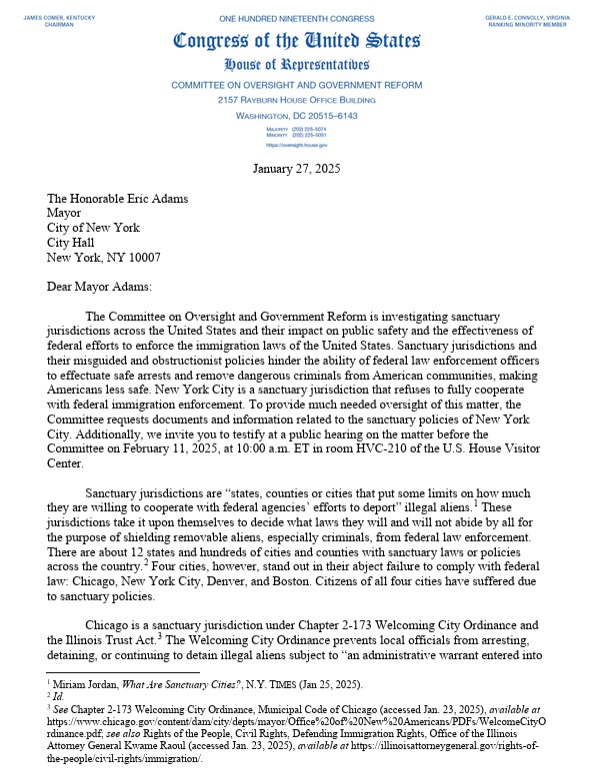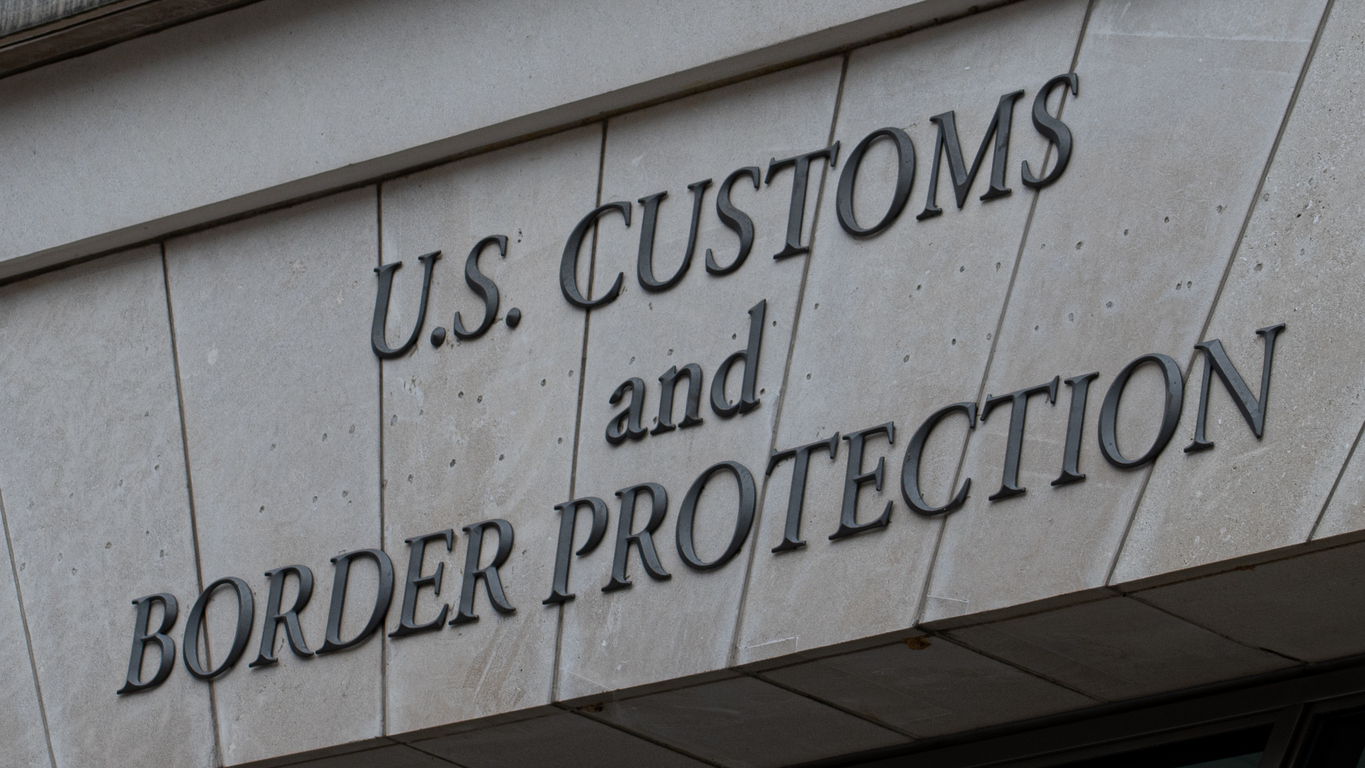The chronology of the posts belies @Taichiliberal's claims.
You are using an out of date browser. It may not display this or other websites correctly.
You should upgrade or use an alternative browser.
You should upgrade or use an alternative browser.
Trump ends federal funding to sanctuary cities.
- Thread starter T. A. Gardner
- Start date
SlaveForChrist
Verified User
I'm an actual conservative on this. I think the Federal law enforcement agencies should hunt down and remove all illegals. But states and cities and sheriffs have the right to not work with the federal agencies.Several Democrat mayors are being called to appear before Congress.

States and cities and sheriffs have the right to not work with the federal agencies.
Do they?
The question of whether states, cities, and sheriffs have the right to not cooperate with federal agencies on immigration enforcement involves a complex interplay of federalism, law, and policy. Here's a breakdown:
Federal Supremacy and Preemption:
- The U.S. Constitution's Supremacy Clause (Article VI, Clause 2) establishes that federal law is the supreme law of the land. This means federal laws on immigration generally preempt state or local laws when there's a conflict.
- Sanctuary Policies: Many cities and counties have adopted "sanctuary" policies, which limit cooperation with federal immigration enforcement in various ways, like not sharing information about an individual's immigration status or not complying with ICE detainers unless they meet certain local legal standards or court orders. These policies are based on the principle of local control over local law enforcement priorities.
- Legal Challenges: There have been legal battles over these sanctuary policies. For instance, in 2018, the Supreme Court case City of Chicago v. Sessions resulted in an injunction against conditions that would cut off federal funding to sanctuary cities for non-cooperation with federal immigration enforcement, suggesting some level of local autonomy.
- State and Local Law Enforcement: While states and local governments can decide how to use their resources, there are limits. For example, the 1996 Illegal Immigration Reform and Immigrant Responsibility Act (IIRIRA) mandates some cooperation, like notifying immigration authorities about certain criminal aliens in custody. However, the specifics of how and when this must be done have been subjects of debate and litigation.
- Sheriffs and Local Police: Sheriffs and local police forces have discretion in how they allocate their resources. However, they are bound by federal law, and there's ongoing debate about what constitutes lawful or unlawful refusal to cooperate.
- Resource Allocation: Local law enforcement often argues that they have limited resources and should focus on local crime rather than immigration enforcement, which they see as a federal responsibility.
- Community Relations: There's also a concern that enforcing federal immigration laws could erode trust between local law enforcement and immigrant communities, potentially impacting public safety.
- Legislation like the "Stop Dangerous Sanctuary Cities Act" has been proposed in Congress but hasn't passed into law, indicating the contentious nature of this issue. Without a clear, recent decision or law, the situation remains fluid, with different jurisdictions interpreting their obligations and rights differently.
@Grok
SlaveForChrist
Verified User
Tren de Aragua are 'women with children"?What criminals? They're women with children.
In any case, crossing the border illegally is a criminal offense.
SlaveForChrist
Verified User
Yes. Any other retarded questions, Trump's smegma snacker?Do they?
In any case, crossing the border illegally is a criminal offense.
Indeed.
- Federal Law: The primary statute that criminalizes illegal border crossing is 8 U.S.C. § 1325, which deals with improper entry by an alien. This law makes it a misdemeanor for anyone to:
- Enter or attempt to enter the United States at any time or place other than as designated by immigration officers.
- Elude examination or inspection by immigration officers.
- Attempt to enter or obtain entry to the United States by a willfully false or misleading representation or the willful concealment of a material fact.
- Penalties:
- For a first or second offense under § 1325, it's classified as a misdemeanor with penalties that include up to six months in prison, a fine, or both.
- Subsequent violations can lead to felony charges under 8 U.S.C. § 1326, which can result in imprisonment for up to two years for the first reentry after deportation, with penalties increasing for further reentries or if the deportation was related to certain criminal convictions.
- Civil vs. Criminal: It's important to distinguish that while illegal entry is a criminal offense, many aspects of immigration enforcement also involve civil proceedings. For example, deportation itself is typically a civil rather than a criminal matter, although criminal charges can be pursued concurrently.
- Policy and Enforcement: Enforcement of these laws can vary significantly based on policy decisions by different administrations. Some administrations might prioritize prosecuting all illegal entries, while others might focus more on strategic enforcement based on factors like criminal history or public safety threats.
- Legal Challenges and Debates: There have been debates and legal challenges regarding how these laws are enforced, especially concerning policies like "zero tolerance" where all adults crossing the border illegally are criminally prosecuted, leading to family separations. Courts have ruled on various aspects, sometimes limiting certain enforcement practices.
- Asylum Seekers: The situation can be more complex for those seeking asylum, as international law and U.S. law provide protections for those with a well-founded fear of persecution in their home countries. However, even asylum seekers must present themselves at designated ports of entry or face potential criminal charges for illegal entry.
@Grok
A misdemeanor.Tren de Aragua are 'women with children"?
In any case, crossing the border illegally is a criminal offense.
SlaveForChrist
Verified User
WHo in the fuck cares what color their skin is? An illegal is an illegal, whether they're a fucking albino or look like they were birth from obsidian.You fool! Do you think that these draconian policies will ONLY affect the non-white folk? Do a little research as to the wake up call MAGA mouthpiece Riley Gaines got regarding her husband. Classic!
SlaveForChrist
Verified User
Misdemeanors are crimes, shitfuck. And re-entry is a felony. As are the many things that illegals then do after entering.A misdemeanor.
How many women with children re-entered?Misdemeanors are crimes, shitfuck. And re-entry is a felony. As are the many things that illegals then do after entering.
SlaveForChrist
Verified User
Bro lets Elon's AI demon do his thinking for him.Indeed.
In conclusion, crossing the U.S. border without proper authorization is indeed a criminal offense under current U.S. law.
- Federal Law: The primary statute that criminalizes illegal border crossing is 8 U.S.C. § 1325, which deals with improper entry by an alien. This law makes it a misdemeanor for anyone to:
- Enter or attempt to enter the United States at any time or place other than as designated by immigration officers.
- Elude examination or inspection by immigration officers.
- Attempt to enter or obtain entry to the United States by a willfully false or misleading representation or the willful concealment of a material fact.
- Penalties:
- For a first or second offense under § 1325, it's classified as a misdemeanor with penalties that include up to six months in prison, a fine, or both.
- Subsequent violations can lead to felony charges under 8 U.S.C. § 1326, which can result in imprisonment for up to two years for the first reentry after deportation, with penalties increasing for further reentries or if the deportation was related to certain criminal convictions.
- Civil vs. Criminal: It's important to distinguish that while illegal entry is a criminal offense, many aspects of immigration enforcement also involve civil proceedings. For example, deportation itself is typically a civil rather than a criminal matter, although criminal charges can be pursued concurrently.
- Policy and Enforcement: Enforcement of these laws can vary significantly based on policy decisions by different administrations. Some administrations might prioritize prosecuting all illegal entries, while others might focus more on strategic enforcement based on factors like criminal history or public safety threats.
- Legal Challenges and Debates: There have been debates and legal challenges regarding how these laws are enforced, especially concerning policies like "zero tolerance" where all adults crossing the border illegally are criminally prosecuted, leading to family separations. Courts have ruled on various aspects, sometimes limiting certain enforcement practices.
- Asylum Seekers: The situation can be more complex for those seeking asylum, as international law and U.S. law provide protections for those with a well-founded fear of persecution in their home countries. However, even asylum seekers must present themselves at designated ports of entry or face potential criminal charges for illegal entry.
@Grok
SlaveForChrist
Verified User
It doesn't matter, cumswatch. Misdemeanors are crimes as well. They are criminals, and basically anything they do after committing that crime is a crime as wellHow many women with children re-entered?
volsrock1
Verified User
A misdemeanor.
Is Unlawful Entry a Felony?
Yes, unlawful entry is a felony. And having a felony offense makes it extremely difficult to legally reenter the United States. A list of undocumented immigration civil offenses and violation consequences are listed below.
Is Illegal Immigration a Felony? US Illegal Entry Penalties
Illegally crossing the border into the United States is a crime. Search for Immigration Lawyer representation if you or a Loved one needs help. Call Today
@Legion can't think. All he does is copying and pasting. He lets @Grok do all the thinking for him.Bro lets Elon's AI demon do his thinking for him.
If every illegal immigrant is removed from the country you would not notice any difference.Taking bets on how long before they fold.
Trump has ended federal funds to sanctuary cities.

Trump's order to cut off funding to sanctuary cities could threaten L.A. fire relief
Trump's order to cut off funding to sanctuary cities could threaten L.A. fire reliefwww.latimes.com

AG Pam Bondi orders DOJ to pause all funding for sanctuary cities
Bondi, 59, issued the edict shortly after being sworn in by Supreme Court Justice Clarence Thomas at an Oval Office ceremony with President Trump in attendance.nypost.com

Trump Raises New Threat to Sanctuary Cities: Blocking Transportation Dollars
A new order revives an old battle about how much an administration is allowed to coerce cities and states by withholding money.www.nytimes.com
Really?If every illegal immigrant is removed from the country you would not notice any difference.
Is that so?Really?


